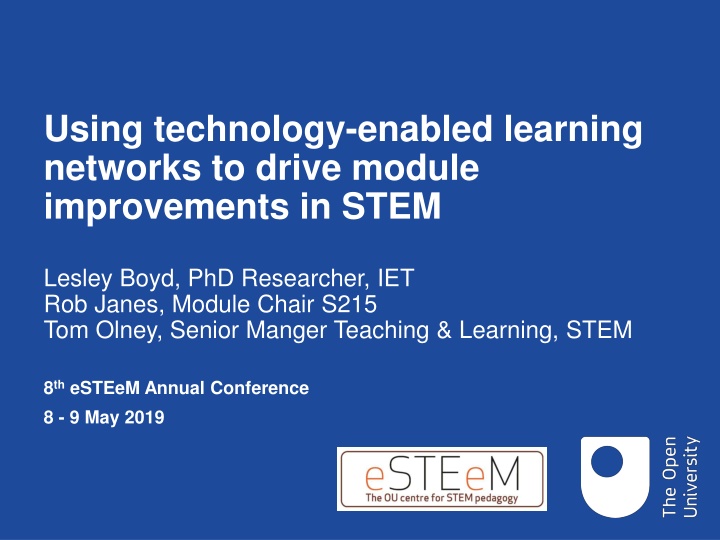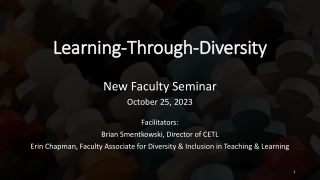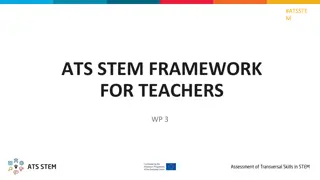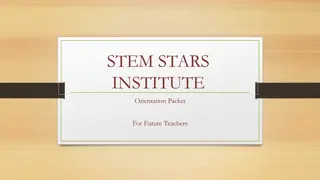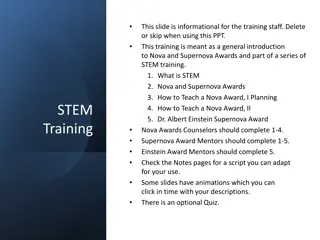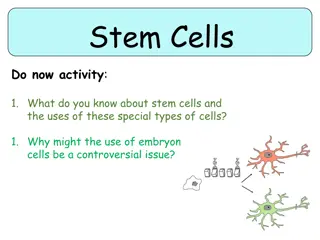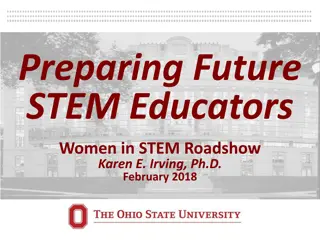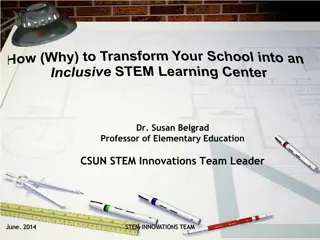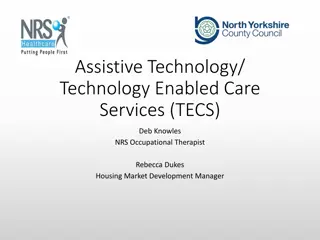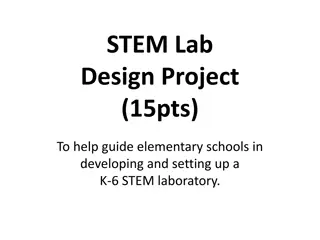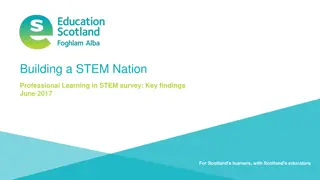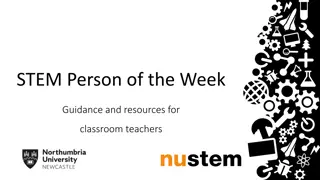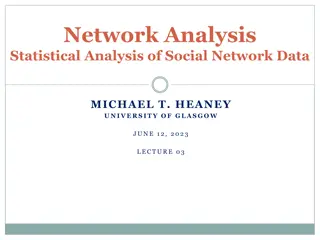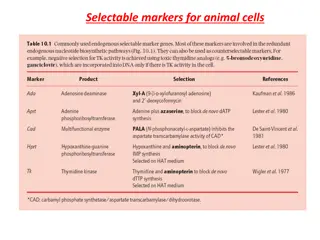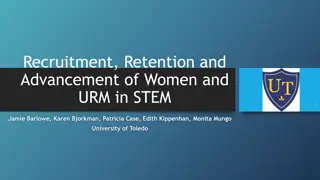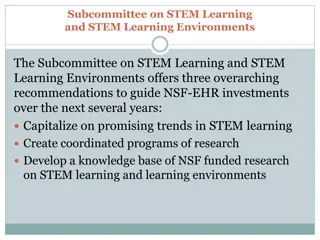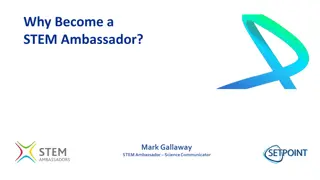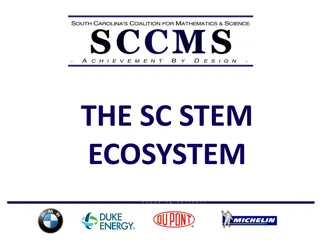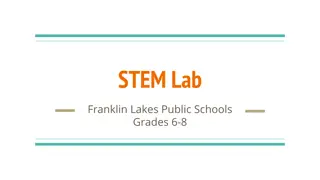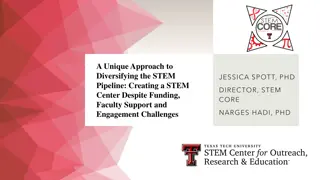Enhancing STEM Module Improvements Through Technology-Enabled Learning Networks
Explore a collaborative action research story focusing on using technology-enabled learning networks to drive improvements in STEM modules. Discover the methodology, results, and next steps in this innovative approach that aims to connect practitioners across various contexts for practical enhancement outcomes.
Download Presentation

Please find below an Image/Link to download the presentation.
The content on the website is provided AS IS for your information and personal use only. It may not be sold, licensed, or shared on other websites without obtaining consent from the author.If you encounter any issues during the download, it is possible that the publisher has removed the file from their server.
You are allowed to download the files provided on this website for personal or commercial use, subject to the condition that they are used lawfully. All files are the property of their respective owners.
The content on the website is provided AS IS for your information and personal use only. It may not be sold, licensed, or shared on other websites without obtaining consent from the author.
E N D
Presentation Transcript
Using technology-enabled learning networks to drive module improvements in STEM Lesley Boyd, PhD Researcher, IET Rob Janes, Module Chair S215 Tom Olney, Senior Manger Teaching & Learning, STEM 8theSTEeM Annual Conference 8 - 9 May 2019
Using technology-enabled learning networks to drive module improvements in STEM An action research story of collaborative participation in problem solving and improvement, and putting ALs close to the solution . 1. 2. 3. What s a learning network? Methodology A brief history of the project Phase 1 (17J) & Phase 2 (18J) Results so far What are the next steps? 4. 5. 09/10/2024
Whats a learning network? Task driven Technology-enabled Collaborative Structured Connecting together disparate practitioners across our different contexts and boundaries, eg ALs, module teams, staff tutors, Learning Design Aiming for a particular practical improvement outcome No known right answer 09/10/2024
Methodology Technology-enabled participatory action research Learn together in an unfolding and emergent process Equitable Collaborative Joint ownership: discussion, action planning, implementation & evaluation Underpinned by Grounded Theory Method (GTM) Exploring a new conceptual framework regarding the unfolding process, and driving round the progressive action research cycles in a structured and rigorous manner. 09/10/2024
Action research table top model Source: Coghlan, D. and Brannick, T. (2014) Doing Action Research in Your Own Organisation, London, Sage. 09/10/2024
A collaborative conversation Image: Getty Images/iStockphoto 09/10/2024
Methodology why GTM? A theory-building, not theory-testing or theory-verification methodology. Systematic data collection and analysis. Far better to allow the data to tell its own story in the first instance, build a theory, then, subsequently, engage your theory with the theory that you thought you might impose initially. You can see if your emergent theory confirms or challenges existing theories. So, potentially GTM has a huge role to play in theory building, in all disciplines . Urquhart, C. (2013) Grounded Theory for Qualitative Research: A Practical Guide, London, Sage. Sannino and Engestr m (2017) describe looking in vain for recent discussions of theoretically and methodologically ambitious approaches of intervention research in major journals. Sannino, A. and Engestr m, Y. (2017) Co-generation of societally impactful knowledge in Change Laboratories. Management Learning, vol.48, no.1, pp.80-96. 09/10/2024
Brief history of the project Phase 1: learning networks hosted in dedicated VLE sites for each of three pilot modules on Tricky Topics. discussion forums and online workshops used to seek feedback from tutors, in order to collaboratively identify Tricky Topics and suggest improvements or produce learning interventions. S215 ALs and the module team very successfully identified a list of conceptual Tricky Topics, plus a list of additional issues including pace and volume of material. ALs designed and implemented four innovative Tricky Topics intervention videos, which have been in use on the 17J and 18J module website, shared with other modules and emulated elsewhere. Phase 2: second cycle of collaborative work building on the analysis from the first cycle in S215. Since tutors had identified concerns about pace and volume of material, an online workshop and discussion forum shared and interpreted specialised learning design analytics visualisations with tutors with the aim of identifying areas for further new interventions. 09/10/2024
Learning Network site 09/10/2024
Using learning design analytics The three visualisations discussed with S215 ALs were: 1) expected student workload by activity type 2) comparison of expected student workload and MT advised workload per week 3) comparison of expected student workload by activity type and average VLE engagement 09/10/2024
Results so far Phase 2 The learning network discussions have highlighted a number of issues, represented in an interactive spreadsheet, which organises the supporting qualitative evidence. These issues include pace and volume of material, prerequisite knowledge and online / offline study behaviour. All these issues have contributed towards the planning of four actions: production and trialling of signposting material for Blocks 9 and 10 finding out more re student preparedness and study choices before S215 finding out more re online / offline study behaviour, and which resources students download clarifying issues re the use of OU Analyse The trial signposting materials have been produced by an AL, reviewed by the module team, and implemented in the current presentation. 09/10/2024
Analysis interactive spreadsheet Two years of qualitative feedback from the 17J and 18J learning network discussion forums, which is now represented for both years in a new navigable interactive spreadsheet. 09/10/2024
Results so far Phase 2 Two Study Pathway Analysis reports for 17J and 18J, have been produced for the project by a STEM Data Wrangler. These reports illustrate the module combinations and presentations taken by 17J and 18J students before S215. The Study Pathway Analysis reports illustrate an extremely scattered picture of previous study pathways, taken over many years. In 18J, out of 160 students in total, there were 71 different pathways; all but the first 7 were unique to one student. 32%, or 51/160 students followed the recommended route of S111+S112. The Module Chair has collected some informal feedback from a selection of students at the recent Residential Schools, with initial positive feedback for the trial signposting documents and underscoring the concerns over pace and volume of material. 09/10/2024
Next steps The next stage is currently being undertaken: to consider all the data and possible actions, and plan for some questions direct to students, using the Real Time Student Feedback Tool (RTSF), before the students sit their exam in early June. The project now has organised qualitative longitudinal evidence from the ALs, staff tutors and module team in 17J and 18J, and looking to underscore this with direct feedback from students. Students will be asked during the RTSF whether they would like to provide further individual or discussion group feedback post exam. Evaluations: effectiveness of each action research cycle collaboration and joint ownership integration of evaluations at intervention level, module level, qualification level, and organisational learning or systemisation level 09/10/2024
Next steps The acquired data and qualitative feedback may help inform future module wide improvement actions, adjustments to the learning design, provide support to inform AL teaching practice, and answer the questions and issues raised by their participation in the learning network thus far. All the data, learning analytics visualisations, discussion forums and analysis of the issues with supporting evidence are held in a dedicated VLE site for S215, which is accessible by all participants and stakeholders. The grounded theory analysis will be extended to consolidate and strengthen the emerging conceptual framework of technology-enabled organisational learning, and compared back to other existing and emerging conceptual frameworks in the literature. Evaluation of use of GTM to explore a new conceptual framework and drive round progressive AR cycles in a structured and rigorous manner. Does it yield actionable knowledge, which is usable by practitioners whilst being sufficiently theoretically robust? (Coghlan and Brannick, 2014). 09/10/2024
Thank you Any questions? lesley.boyd@open.ac.uk rob.janes@open.ac.uk tom.olney@open.ac.uk
